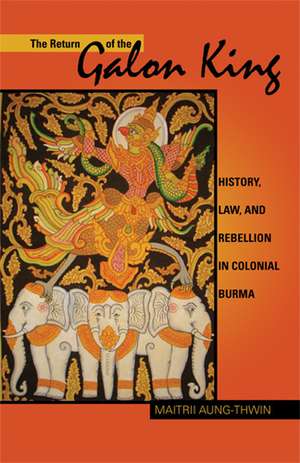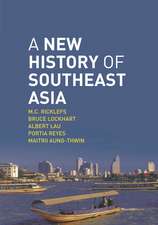The Return of the Galon King: History, Law, and Rebellion in Colonial Burma: Ohio RIS Southeast Asia Series, cartea 124
Autor Maitrii Aung-Thwin, Maitrii Aung–Thwinen Limba Engleză Paperback – 16 noi 2010
In late 1930, on a secluded mountain overlooking the rural paddy fields of British Burma, a peasant leader named Saya San crowned himself King and inaugurated a series of uprisings that would later erupt into one of the largest anti-colonial rebellions in Southeast Asian history. Considered an imposter by the British, a hero by nationalists, and a prophet-king by area-studies specialists, Saya San came to embody traditional Southeast Asia’s encounter with European colonialism in his attempt to resurrect the lost throne of Burma.
The Return of the Galon King analyzes the legal origins of the Saya San story and reconsiders the facts upon which the basic narrative and interpretations of the rebellion are based. Aung-Thwin reveals how counter-insurgency law produced and criminalized Burmese culture, contributing to the way peasant resistance was recorded in the archives and understood by Southeast Asian scholars.
This interdisciplinary study reveals how colonial anthropologists, lawyers, and scholar-administrators produced interpretations of Burmese culture that influenced contemporary notions of Southeast Asian resistance and protest. It provides a fascinating case study of how history is treated by the law, how history emerges in legal decisions, and how the authority of the past is used to validate legal findings.
The Return of the Galon King analyzes the legal origins of the Saya San story and reconsiders the facts upon which the basic narrative and interpretations of the rebellion are based. Aung-Thwin reveals how counter-insurgency law produced and criminalized Burmese culture, contributing to the way peasant resistance was recorded in the archives and understood by Southeast Asian scholars.
This interdisciplinary study reveals how colonial anthropologists, lawyers, and scholar-administrators produced interpretations of Burmese culture that influenced contemporary notions of Southeast Asian resistance and protest. It provides a fascinating case study of how history is treated by the law, how history emerges in legal decisions, and how the authority of the past is used to validate legal findings.
Din seria Ohio RIS Southeast Asia Series
-
 Preț: 259.31 lei
Preț: 259.31 lei -
 Preț: 268.56 lei
Preț: 268.56 lei -
 Preț: 295.55 lei
Preț: 295.55 lei -
 Preț: 440.63 lei
Preț: 440.63 lei -
 Preț: 293.22 lei
Preț: 293.22 lei -
 Preț: 236.19 lei
Preț: 236.19 lei -
 Preț: 227.12 lei
Preț: 227.12 lei -
 Preț: 275.22 lei
Preț: 275.22 lei -
 Preț: 354.83 lei
Preț: 354.83 lei -
 Preț: 254.68 lei
Preț: 254.68 lei -
 Preț: 260.45 lei
Preț: 260.45 lei -
 Preț: 235.78 lei
Preț: 235.78 lei -
 Preț: 254.68 lei
Preț: 254.68 lei -
 Preț: 295.09 lei
Preț: 295.09 lei -
 Preț: 207.34 lei
Preț: 207.34 lei -
 Preț: 272.32 lei
Preț: 272.32 lei -
 Preț: 131.60 lei
Preț: 131.60 lei -
 Preț: 293.81 lei
Preț: 293.81 lei -
 Preț: 228.65 lei
Preț: 228.65 lei -
 Preț: 229.03 lei
Preț: 229.03 lei -
 Preț: 209.43 lei
Preț: 209.43 lei - 6%
 Preț: 203.85 lei
Preț: 203.85 lei -
 Preț: 260.45 lei
Preț: 260.45 lei -
 Preț: 282.62 lei
Preț: 282.62 lei -
 Preț: 242.35 lei
Preț: 242.35 lei -
 Preț: 285.81 lei
Preț: 285.81 lei -
 Preț: 260.45 lei
Preț: 260.45 lei - 7%
 Preț: 187.76 lei
Preț: 187.76 lei - 12%
 Preț: 190.70 lei
Preț: 190.70 lei
Preț: 269.44 lei
Nou
Puncte Express: 404
Preț estimativ în valută:
51.56€ • 54.08$ • 42.92£
51.56€ • 54.08$ • 42.92£
Carte tipărită la comandă
Livrare economică 01-15 aprilie
Preluare comenzi: 021 569.72.76
Specificații
ISBN-13: 9780896802766
ISBN-10: 0896802760
Pagini: 264
Dimensiuni: 140 x 216 x 20 mm
Greutate: 0.27 kg
Ediția:1
Editura: Ohio University Press
Colecția Ohio University Press
Seria Ohio RIS Southeast Asia Series
ISBN-10: 0896802760
Pagini: 264
Dimensiuni: 140 x 216 x 20 mm
Greutate: 0.27 kg
Ediția:1
Editura: Ohio University Press
Colecția Ohio University Press
Seria Ohio RIS Southeast Asia Series
Recenzii
“Return of the Galon King is a brilliant example of listening to one's sources, rather than talking past them. By trying to understand what the Rebellion Tribunal was actually about, not what we want it to be about, Aung-Thwin has created an indispensable work out of an indispensable historical episode.”—Journal of Southeast Asian Studies
“The Return of the Galon King is a valuable addition not just to the study of Burma, but also the study of Southeast Asian history as a whole.”—Journal of the Economic and Social History of the Orient
“Maitrii Aung-Thwin’s latest study of the Saya San Rebellion is a powerful critique of the existing historiography on the subject…. It represents an important contribution to the study of colonial Burma, particularly by introducing elements of post-colonial theory that have hitherto been absent from the field.”—South East Asia Research
“In a meticulous re-examination of the evidence, (Aung-Thwin) argues convincingly that the narrative of the rebellion was constructed by the colonial authorities from already existing colonial interpretations and reports of Burmese attitudes and peasant behavior. Thoroughly sifting the colonial record and the record of Saya San’s trial, the author shows how a picture of peasant attitudes and behaviour assembled in the half-century before the rebellion was used to define the events of 1930–1932…. For almost seventy years scholars have taken the colonial rendering of the rebellion as the starting point for analysis.”—Asian Review of Books
“An important contribution to Myanmar studies, historiography, and social science methodology.”—Robert H. Taylor, author of The State in Burma and Burma: Political Economy under Military Rule
Notă biografică
Maitrii Aung-Thwin is an assistant professor of Southeast Asian History at the National University of Singapore.
Descriere
In late 1930, on a secluded mountain overlooking the rural paddy fields of British Burma, a peasant leader named Saya San crowned himself King and inaugurated a series of uprisings that would later erupt into one of the largest anti-colonial rebellions in Southeast Asian history.






